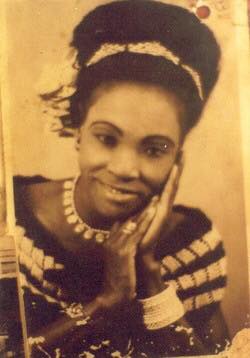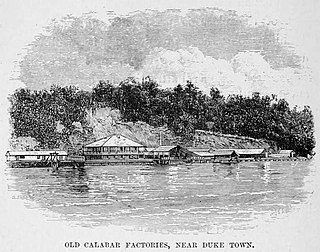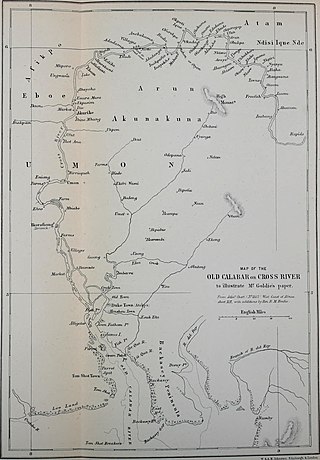
The Ibibio people are a coastal people in southern Nigeria. They are mostly found in Akwa Ibom and Cross River States. They are related to the Efik people. During the colonial period in Nigeria, the Ibibio Union asked for recognition by the British as a sovereign nation.
The Anaang are an ethnic group in southern Nigeria, whose land is primarily within 8 of the present 31 local government areas in Akwa Ibom State: Abak, Essien Udim, Etim Ekpo, Ika, Ikot Ekpene, Obot Akara, Oruk Anam, Ukanafun in Akwa Ibom State. The Anaang are the second largest ethnic group in Akwa Ibom state.

Cross River State is a state in the South-South geopolitical zone of Nigeria. Named for the Cross River, the state was formed from the eastern part of the Eastern Region on 27 May 1967. Its capital is Calabar, it borders to the north through Benue state, to the west through Ebonyi state and Abia state, and to the southwest through Akwa Ibom state, while its eastern border forms part of the national border with Cameroon. Originally known as the South-Eastern State before being renamed in 1976, Cross River state formerly included the area that is now Akwa Ibom state, which became a distinct state in 1987.

Calabar is the capital city of Cross River State, Nigeria. It was originally named Akwa Akpa, in the Efik language. The city is adjacent to the Calabar and Great Kwa rivers and creeks of the Cross River.

The Niger Delta is the delta of the Niger River sitting directly on the Gulf of Guinea on the Atlantic Ocean in Nigeria. It is located within nine coastal southern Nigerian states, which include: all six states from the South South geopolitical zone, one state (Ondo) from South West geopolitical zone and two states from South East geopolitical zone.

The Efik are an ethnic group located primarily in southern Nigeria, and western Cameroon. Within Nigeria, the Efik can be found in the present-day Cross River State and Akwa Ibom state. The Efik speak the Efik language which is a member of the Benue–Congo subfamily of the Niger-Congo language group. The Efik refer to themselves as Efik Eburutu, Ifa Ibom, Eburutu and Iboku.

Nsibidi is a system of symbols or proto-writing developed by the Ekpe secret society of the old Calabar Kingdom that is now made up of Cross River State and Akwa Ibom State of Southern of Nigeria. They are classified as pictograms, though there have been suggestions that some are logograms or syllabograms.

Chief Margaret Ekpo//(listen) was a Nigerian women's rights activist and social mobilizer who was a pioneering female politician in the country's First Republic and a leading member of a class of traditional Nigerian women activists, many of whom rallied women beyond notions of ethnic solidarity. She played major roles as a grassroots and nationalist politician in the Eastern Nigerian city of Aba, in the era of a hierarchical and male-dominated movement towards independence.

The Kalabari are a sub-group of the Ijaw people living in the eastern Niger Delta region of Nigeria. Originally, they were known as the Awome. The name Kalabari was derived from their ancestor Perebo Kalabari who was a son of Mein Owei. Their original settlement was spelt as Calabar by the Portuguese which was pronounced Kalabari. This settlement (town) was abandoned as the people moved to other fishing settlements. Portuguese settlers continued to maintain the name Calabari which became surrounded by the Efik people of Duke town. When the British came the word Calabari was pronounced as Calabar (Kalaba) instead of Kalabari. At this time the original Ijoid Kalabaris had moved to a new location which became the new Calabar territory since the old Calabar is occupied by different people. Old Calabar became an Efik town with time which has the name Calabar.

The Obolo people are an ethnic group in the Niger Delta region of Nigeria. Obolo people are found in Rivers State and Akwa Ibom State. They have historical relations with the Oron people, Ohafia, Igbo Ogoloma, Ido, and Ibeno people, who are also from the Niger Delta.

The Oron people or Örö people are a multi-ethnic tribal grouping, that make up the Akpakip Oro or Oron Nation. The Örö are located primarily in southern Nigeria in the riverine area of Akwa Ibom and the Cross River States and in Cameroon. Akpakip Oro are regarded as an ancient warrior people, speaking the Oro language which is in the Cross River language family of the Benue–Congo languages. They are ancestrally related to the Efik people of the Cross River State, the Ibeno and Eastern Obolo in Akwa Ibom, the Andoni people in Rivers State and the Balondo-ba-Konja in the Congo.
Ibom kingdom was an Ibibio nation with its seat of government in Obot Okon Ita. This kingdom was located between present day Abia and Akwa Ibom states in Southeastern Nigeria. Around 1630, an Igbo group from Abiriba known as the Eze Agwu arrived to Ibom. This caused a long term conflict and stalemate known as the Aro-Ibibio Wars. The Ibom Kingdom is our ancient home which the Europeans tried to delete its name, history, EKPE, Obon culture and its NSIBIDI ancient writing.

Duke Town, originally known as Atakpa is an Efik city-state that flourished in the 19th century in what is now southern Nigeria. The City State extended from now Calabar to Bakassi in the east and Oron to the west. Although it is now absorbed into Nigeria, traditional rulers of the state are still recognized. The state occupied what is now the modern city of Calabar.
Bassey Ekpo Bassey II is a Nigerian journalist and politician
The Humono language, Kohumono, is an Upper Cross River language of Nigeria spoken by the Bahumono people in Abi Local Government Area of Cross River State.

The Akunakuna are an ethnic group of Nigeria and Cameroon, closely related to the Efik, Bahumono and Ibibio people, mostly inhabiting the area around the Cross River. Recent figures have indicated there are over three hundred fifty thousand Akunakuna people.

Ekpo (Ghost) is a cultural society art form that originates from the Efik, Ibibio and Annang People in the Cross River/Akwa Ibom in Southern Nigeria. The practice was also adopted by neighboring regions, namely Arochukwu and Ohafia (Abia state) during the expansion of the Aro-Kingdom.
Abi is a Local Government Area in Cross River State, Nigeria. It contains several Igbo and Bahumono villages and is home to an annual cultural festival.
Usumutong is a community situated in Abi local government area of Cross River State, Nigeria.
Ediba is a village in Abi local government area of Cross River State, Nigeria.













